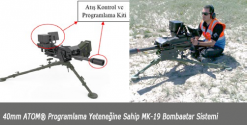You are using an out of date browser. It may not display this or other websites correctly.
You should upgrade or use an alternative browser.
You should upgrade or use an alternative browser.
The War in the Ukraine
- Thread starter SampanViking
- Start date
There's probably considerations with balancing loitering time with risk of destruction via enemy fire. Until very recently Ukraine didn't have the capability to hit this far in the rear and cause this much damage.Letting aircrafts near the frontlines help CAS but they become juicy stationaries targets at the same time...
Turkey has been using 40 mm grenade AHEAD against drones for some time. It is short range but is effective and crew mobile. Has useful anti-infantry uses too.There just too much dispersion.
Kinda why something like Deriviyatsia and AHEAD is needed. the drone are just too small to hit properly with "direct hit" kinetic munitions.



Ukraine is also soon receiving first patch of GLSDB's and unlike ATACMS those are still in production and large quantaties can be delivered.
Daily +150km precision strikes against logistics.
Uh huh, just like those daily Storm Shadow and GMLRS strikes that haven't really materialized. There are no wonder weapons, the Russians will adjust accordingly and the weapon will become a lot less effective.
As Kofman reiterated, new capabilities often make the most impact when they are introduced, with a steady drop-off with time.
As Kofman reiterated, new capabilities often make the most impact when they are introduced, with a steady drop-off with time.
Its probably why they went all out this time to take advantage of the surprise factor.
But this new capability as soon as it is introduced could have repercussions on the ground, when Russia was on the offensive in Donbas in the summer of 2022, the Himars were introduced and attacked several Russian logistical depots and storage, seriously damaging the Russian offensive effort in Donbas.Uh huh, just like those daily Storm Shadow and GMLRS strikes that haven't really materialized. There are no wonder weapons, the Russians will adjust accordingly and the weapon will become a lot less effective.
As Kofman reiterated, new capabilities often make the most impact when they are introduced, with a steady drop-off with time.
ATACMS with this attack will cripple Russia's ability to use helicopters effectively, forcing them to disperse heavily or more likely, move much further away from the front line, which could have consequential effects on the ground.
But this new capability as soon as it is introduced could have repercussions on the ground, when Russia was on the offensive in Donbas in the summer of 2022, the Himars were introduced and attacked several Russian logistical depots and storage, seriously damaging the Russian offensive effort in Donbas.
It's hard to gauge how effective GMLRS strikes were in totality, considering tha Russians were lobbing over 15,000 shells a day during some periods. Though I do concede that GMLRS had a massive impact on the war.
Moreover, while there were some notable strikes, in particular the Wagner HQ, the strike on a building with over 500 men, the reality is that the GMLRS was "game-changing" because it forced the entire Russian Army to adapt, rather than it's physical effect (destruction of enemy assets). Now I haven't served in an army, but I have managed people before. Getting 10 people to learn new warehouse procedures was like pulling teeth. Getting 150,000 men to do so? Can't imagine it.
It's a miracle that the Russian Army adapted as well as it did. Comparatively, adapting to an occasional ballistic missile strike is going to be much less painful. But sure, I won't be surprised to see a high profile attack every few days for the next 3-6 months or so. I just don't think that these "wonder-weapons" are going to significantly alter the current character of this war.
ATACMS with this attack will cripple Russia's ability to use helicopters effectively, forcing them to disperse heavily or more likely, move much further away from the front line, which could have consequential effects on the ground.
I thinky you're really overselling it here. But we'll see. I've been wrong many times before.
They will need to depend on makeshift bases that are moved all the time if they want to stay in range of these standoff ammunitions. Cluster ammo are quite devastating for aircrafts because they cover a large area against these thin skinned and costly system.But this new capability as soon as it is introduced could have repercussions on the ground, when Russia was on the offensive in Donbas in the summer of 2022, the Himars were introduced and attacked several Russian logistical depots and storage, seriously damaging the Russian offensive effort in Donbas.
ATACMS with this attack will cripple Russia's ability to use helicopters effectively, forcing them to disperse heavily or more likely, move much further away from the front line, which could have consequential effects on the ground.
